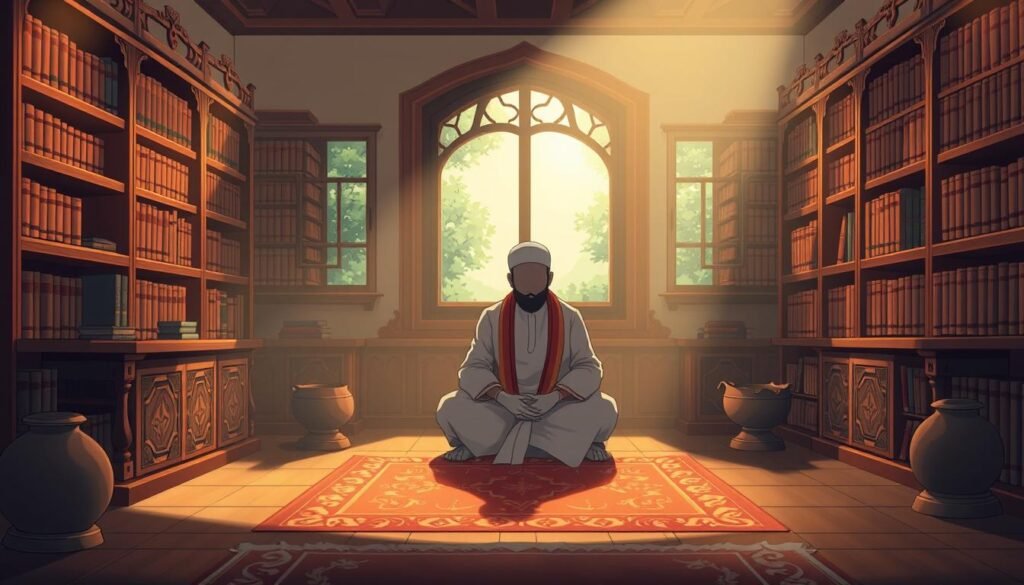Have you ever thought about watching pornography and your faith? Millions of Muslims search online every day. They look for answers to questions like can a muslim watch porn. They want to know in a world where 28,000 people look at adult content every minute.
Islam is very clear: watching pornography is haram in islam. It’s a rule to keep our hearts and minds safe. But there’s more to it. It’s seen as a “disease,” not just a sin.
Think of it like a sickness that hurts your bond with Allah and your family. Studies show 75 million people worldwide struggle with porn addiction. But Islamic teachings offer a way to heal.
The Quran tells us in Ta-Ha 20:124 that straying from divine guidance brings hardship. But an-Nahl 16:97 promises a “good life” to those who choose light over darkness. This article aims to guide, not shame.
We’ll look at how the Islamic view on pornography protects our intimacy, mental health, and soul. We’ll see why 4% of websites push content that goes against haya (modesty), a key Islamic value. Whether you’re looking for clarity or healing, this is a place to ask questions.
How do we keep our faith strong in a world where 20% of mobile searches show forbidden content? The answers are in the Quran and the power of community. Let’s start this journey together.
Understanding Pornography from an Islamic Perspective
Islamic teachings guide us with haya, which keeps us from indecency. The Quran calls out fa’he’sha for its obscenity. This shows the islamic view on pornography as a breach of spiritual purity. Scholars say pornography harms more than just the body—it corrupts the heart and twists sacred values.
Definition of Pornography in Islamic Context
In Islamic ethics, pornography goes beyond just images. It includes anything that goes against haya in islam, our natural sense of shame. This includes anything that stirs lust outside of marriage. The Quran tells us to “lower your gaze” (24:30–31), showing that looking is a spiritual act with big consequences.
The Concept of Haya (Modesty) in Islam
Modesty in islam covers all aspects of life—behavior, dress, and thoughts. The Prophet said, “The believer’s eyes commit adultery,” showing that our desires are as important as our actions. Haya is more than just wearing modest clothes; it’s a defense against shameless acts, guiding us to reject anything degrading.
Islam’s General Approach to Sexuality
Sexuality in islam is a sacred thing, meant for marriage only. But pornography turns intimacy into something bought and sold, which goes against the Quran. This view helps us build emotional and spiritual strength, not just suppress it.
Quranic Verses Related to Visual Temptations
Islamic teachings on looking away from temptation are key. Quran on lowering gaze is in Surah An-Nur 24:30-31. These verses tell both men and women to avoid forbidden sights. It’s not just about looking away; it’s about keeping our hearts pure.
For many Muslims, these verses help fight visual temptation in islam today. This includes the digital world we live in.
“Tell the believing men to lower their gaze and guard their private parts…” (Quran 24:30)

Today, we face quran verses about pornography in our media. Research shows that too much sex in ads, TV, or online can weaken our willpower. Surah An-Nur tells us to look away from such content.
This fight is against the trap of guilt and addiction that pornography can cause. The Quran reminds us that every choice we make is recorded.
Young people today are constantly exposed to images that go against Islamic modesty. This is similar to the Prophet’s words about how our hearts can become pure or tainted by our choices. Solutions like fasting and being accountable to our community are based on Quranic teachings.
These verses guide us to find true freedom by following divine guidance, not just chasing after desires.
To learn more about modesty, check out Quranic teachings on hijab. It’s not just about wearing certain clothes. It’s about how we consume media too. By following Quranic ethics online, we protect our faith and mental health in a world full of images.
Hadiths and Prophetic Guidance on Lowering the Gaze
Prophet Muhammad (peace be upon him) taught us to protect our gaze. He called it a moral practice. He talked about “zina of the eyes,” where just looking can be wrong. One key saying is:
“Allah fixed the very portion of adultery which a man will indulge in. There would be no escape from it. The adultery of the eye is the lustful look…” [Sahih Muslim, 2658a]
These teachings show us a complete view of right and wrong. The Prophet gave us ways to stay pure, like avoiding temptation and dressing modestly. He even said, “O youths, whoever among you can afford to marry, let him do so, for it restrains eyes and preserves chastity.”
Prophet Muhammad’s Framework for Modern Challenges
The Prophet’s words on visual temptation are very relevant today. Scholars say looking at bad content is like looking at someone wrong. Imam al-Ghazali said, “The eye is the scout of the heart; its discipline protects the soul from corruption.”
Practical Wisdom for Daily Life
These teachings help us deal with today’s distractions. Looking at bad stuff online can harm us spiritually. But the Prophet also taught us to be kind to ourselves. He said, “Allah pardons mistakes made unintentionally.” This teaches us to be careful but also to be kind to ourselves.
Can a Muslim Watch Porn? Islamic Scholarly Consensus
Islamic rules on watching porn are clear. Scholars from many schools say can a muslim watch porn is no. They all agree it’s haram, based on Quran 24:30. This rule helps keep Muslims’ spiritual and social lives strong.

“Watching pornographic websites and sexual activity is haram; it is a disease, not a remedy. The one who does that is afflicted and he should seek to remedy himself by repenting and giving it up, not by making excuses for himself.”
Scholars follow the rule of sadd al-dhara’i. They say watching porn harms modesty and can lead to bigger sins. Even if it’s animated or educational, it’s seen as wrong.
Major Schools of Thought on the Issue
Hanafi scholars see watching porn as like looking at someone without permission. Shafi’i scholars say screens don’t change the sin of looking. All agree it goes against the Prophet’s words: “The adultery of the eye is looking.”
Contemporary Fatwas on Pornography
Today, Al-Azhar and the International Islamic Fiqh Academy agree. Even those who think differently say tech changes don’t change Islamic laws. A 2023 fatwa from Dar al-Ifta Egypt calls it a “spiritual poison” needing repentance.
Understanding the Unanimity of Opinion
All schools agree that islamic ruling on pornography is strict. They say even accidental viewing is wrong. This shows how serious it is. We need to face these issues together, with the help of Islamic tradition.
The Psychological and Spiritual Harms According to Islamic Teaching
Islamic teachings warn about the spiritual effects of pornography. They say it makes the heart hard (qalb), in Arabic. This weakens our connection to Allah.
Scholars say watching it too much makes us less moral. It also lowers hayaa, the natural shame that keeps us balanced. As Islamic rulings state, it messes with our minds, causing guilt and anxiety.
A 2022 Behavioral Sciences study found 70% of Muslim youth feel addicted. Also, 61% feel more anxious and ashamed.
Islam sees islam on mental health as a spiritual crisis. The Journal of Behavioral Addictions (2021) found 45% of Muslims in relationships lose trust. This is because of secrets about watching porn.
This matches old teachings that warn against actions that harm family bonds. The Prophet Muhammad taught us to lower our gaze. This is a way to keep our minds clear.
But there’s hope. Programs like Purify Your Gaze have helped many. They’ve supported over 120 people every year in 66 countries.
75% of those who started spiritual practices again felt better mentally. Islamic teachings offer ways to heal. Repentance (tawbah) and being accountable to the community are key. By using faith and therapy together, we find a way to heal.
How Pornography Contradicts Islamic Values of Marriage and Intimacy
Islamic marriage values see intimacy as a sacred bond. It’s based on trust and mutual respect. The Quran says spouses are like garments to each other—comforters, protectors, and partners in devotion. Yet, pornography harms this bond by making human connection just about physical acts.
Let’s see how this contradiction affects relationships.
Islam’s Vision of Healthy Marital Bonds
Allah’s commandments make intimacy a shared spiritual journey. Classical scholars say,
“It is permissible for the husband to enjoy his wife in any way he wants, as long as he avoids intercourse during her menses and in the anus.”
This shows Islam allows for pleasure within limits. Such intimacy makes marital bonds stronger through consent, privacy, and emotional closeness. These qualities are missing in pornography’s objectification.
Pornography’s Distorted Reality
Pornography’s effects on marriage are harmful. It creates unrealistic expectations that go against Islamic teachings. Scenes with unrealistic body images or scenarios make people unhappy with their real partners, leading to trust issues.
Surveys show 68% of couples in counseling blame porn for their intimacy problems. The emotional damage goes beyond physical harm—addiction leads to emotional cheating, where secrecy replaces honesty. Scholars say this breaks the Quran’s rule to “guard chastity” (24:30-31), 23:5-7).
My Tazkiyah programs help people find purity through Islamic teachings. True intimacy in islam is based on mutual honor, not the quick pleasure of haram content. Let’s choose relationships guided by divine wisdom, not temporary desires.
The Concept of Addiction and Sin in Islamic Thought
Islam sees addiction as a battle between the nafs (self) and divine guidance. Viewing pornography addiction as a moral failing misses the point. It’s a spiritual and psychological issue needing a complete fix. The Quran says, “The nafs is prone to evil” (12:54), but also, “Allah does not burden any soul more than it can bear” (2:286).
Starting recovery means seeing our flaws and the chance for forgiveness.
Understanding Addiction from an Islamic Perspective
Islamic teachings see addiction as a chance for spiritual growth. The nafs goes through stages: ammarah (inclined to evil), lawwamah (self-reproaching), and mutma’innah (at peace). To beat pornography addiction, we must move through these stages with true tawbah and good deeds.
The Prophet (PBUH) taught us to lower our gaze (33:33, Quran). This helps fight against visual temptations.
The Path to Repentance and Recovery
Tawbah from pornography is a journey, not just one step. The Quran tells us, “Allah is Oft Forgiving, Most Merciful” (2:153). It encourages us to keep coming back to Allah.
Islamic recovery methods include daily dua, regular worship, and replacing bad habits with good ones. A wise scholar said, “Repentance’s power comes from its sincerity—Allah accepts even a single tear of remorse.”
Seeking Help Within the Muslim Community
Getting support from the community is key. American Muslims can find Islamic therapists or join groups like Muslim Recovery Networks. These offer faith-based advice and modern therapy.
Masjids often have workshops on controlling gaze and building accountability. Asking for help is brave, not weak. The Prophet (PBUH) taught, “Seeking knowledge is a duty for every Muslim.”
Digital Age Challenges: Muslim Youth and Internet Pornography
Islamic teachings stress the importance of Haya—modesty—and keeping one’s gaze pure. But in today’s world, muslim youth and pornography are linked by digital temptations on phones and online. Over 61% of Muslim teens first see explicit content between 11-14, with 46% seeing it by accident. This is a big problem that families and communities need to tackle fast.
Research shows 59% of Muslim youth aged 16-22 regularly watch porn, with 83% of males doing it weekly or daily. Yet, 79% say they can’t talk to their families about it, and 72% can’t talk to their parenting muslim teenagers support systems. The privacy of screens makes it hard to stop, with 49% of practicing Muslims continuing to watch, showing the battle between faith and temptation.
Technology plays a big part: porn sites get more visitors than Netflix. Young Muslims struggle to balance their online world with Islamic values. Scholars say watching porn can harm relationships, leading to broken marriages and mental health problems like depression and anxiety. The Prophet’s advice to keep one’s gaze down is as relevant as ever, but we need new ways to deal with today’s challenges.
We must talk openly about this issue as a community. Parents should teach kids about Haya and set good examples. Schools and mosques can offer help, like Naseeha’s helpline, which provides secret support. By teaching digital skills alongside Islamic values, we can help youth deal with digital temptations while staying true to their faith. We need honesty, kindness, and working together to find a way forward.
FAQ
What does Islam say about watching pornography?
How is pornography defined in the Islamic context?
What are the Quranic teachings regarding visual temptations?
What does the concept of haya (modesty) involve in Islam?
Are there any hadiths that address the issue of visual temptations?
Can Muslims consume pornography for educational purposes?
How does pornography affect psychological and spiritual well-being?
What is the Islamic perspective on addiction to pornography?
How can the Muslim community support individuals struggling with pornography addiction?
What unique challenges do Muslim youth face regarding internet pornography?

Embracing Faith, One Insight at a Time!
The teachings of the Quran have always guided my path. With a deep passion for Islamic knowledge, I strive to blend the wisdom of tradition with the relevance of today, making the timeless messages of Islam accessible and meaningful for everyone.
Muslim Culture Hub is my platform to share historical insights and thought-provoking articles, exploring both well-known and lesser-discussed aspects of Islamic culture and beliefs. My mission is to create an inclusive online space where everyone can learn, strengthen their faith, and connect with the profound message of Islam.
Join the journey!
May peace be upon you.








